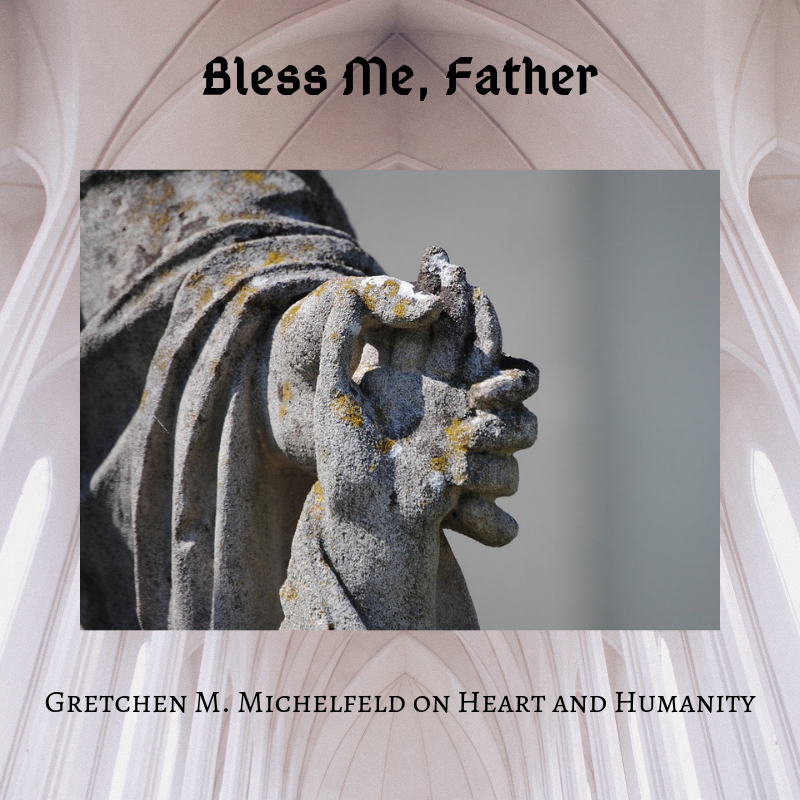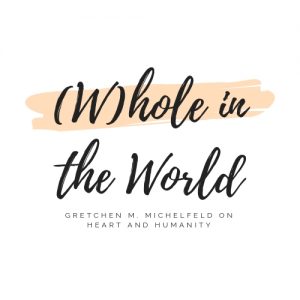7 February Life Changing EncountersHeart and Humanity
Bless Me, Father
(W)hole in the World: Moving Forward in Grief

When I was 8 years old I decided I wanted to go to Church. My memory of my parents’ reaction to this request is fuzzy, but I believe they thought it was amusing. Family legend has it that one day I stopped the dinner conversation cold when I declared that I “wanted to learn more about my Judeo-Christian heritage.”
I know this story is apocryphal. I’ve discovered the hard way that being a people-pleasing kid is often mistaken for being a prodigy and my folks were pretty invested in believing they’d sired a genius. But now, in middle age, I find a deep peace in knowing I was never much of a prodigy and that is perfectly fine.
I was, however, always something of a seeker. I recall, from early on, being drawn to the story of Christ in ways that went beyond Christmas caroling and summer visits to devout grandparents.
Ever vigilant against anything remotely considered in poor taste (my mother’s friends actually gifted her a rubber stamp that said “tacky”) my parents decided that the Episcopal church in our town was my classiest option (you know—the Catholic church was “way too crowded with zealots wearing jeans and sneakers,” the Presbyterians worshipped in that ugly modern building etc.), so off we went to the tastefully restrained little white church with the handsome stained-glass windows, old-fashioned pipe organ and a “high church” service with traditional hymns and soft candlelight.
I know I’m being snarky about my parents. To their credit, these two unwavering atheists always taught us to respect other people’s beliefs—a rare fine lesson in this world of absolute judgment. They also appeared genuinely tickled to bundle us off to Sunday services once in a while. Christ Church in Warwick, NY counted lots of smart, kind, fun, decent people among its parishioners—people happy to offer a handshake or a hug and a “peace be with you,” folks who ran a wonderful thrift shop and a terrific craft fair and who gave their time to the Sunday School and to choir rehearsals.
As a matter of fact, I soon joined that choir. I started going to Sunday School as well, and I chose, at age 9, to be baptized. I began walking to church by myself on the ever-more-frequent Sunday mornings my parents opted to sleep in. “Where did we go wrong?” my folks joked when I told them I wanted to take confirmation class. But they let me do it. That class was the beginning of something that would prove to be monumental in my life—my first encounter with rigorous scholarship.
And my instructor was Father Raymond L. Harbort.
He was the priest of Christ Church, so of course I’d known him for a few years before I started his class. But through that class, I learned to delve deeply into Biblical text. We meticulously outlined the New Testament and then chose which passages to explore more thoroughly. Father Harbort tells me now “I’m quite sure I also instructed you in the 10 Commandments and the Beatitudes as a guide to God’s will and following our Lord.”
Yes indeed, he told me this when I recently searched for and found him! And forty years later he remembers me! When I let him know that his confirmation class had influenced my desire to study English literature he told me that he too had been an English major in college and explained why his approach to our class was so thorough.
“My own instruction for confirmation was only ten weeks long and not very interesting. I later found out what it was really all about at age 16. So, when I became a priest I was determined to try to convey the breadth and depth of the faith in confirmation classes. I sometimes wonder if I didn’t attempt to convey too much at once. God knows.”
Breadth and depth of the faith. More on that later.
One spring evening Father Harbort found me in the hallway outside his office waiting for class to begin. I must have looked upset because he asked me if everything was OK. In response I began weeping uncontrollably, snotting all over my New Testament outline.
You see, my favorite teacher, the one who had given me my first copy of Pride and Prejudice, was moving away forever and it felt like the end of my world. I was a pretty lonely kid—I didn’t exactly fit in with my peers, my home life was chaotic, to say the least—and I had found in this teacher a person whom I believed saw and heard the real me. “I know things are hard for you now,” she’d said that day, “but someday soon, you will shine.”
What did that even mean? How could she leave me?
Father Harbort invited me into his office. He just let me cry as long as I needed to. Oh man, did I cry a lot!
And then, get this—he quoted Tennyson. “Do you know the line ‘Tis better to have loved and lost than never to have loved at all’?” he asked. Wow, no, at age 13 I had never heard that famous phrase, but it actually helped to put the whole thing in perspective. I calmed down and pondered the arc of a lifetime.
“I think I had learned by then that often the most helpful thing one can do is to listen, to let the person who is hurting talk it out. In doing so, they come to find the answers/the meaning of what they are going through by themselves (And, I’d say, with the help of the Holy Spirit),” he wrote to me the other day, “I don’t remember quoting Tennyson. It’s not something I usually would do. But, perhaps I understood you…”
I have carried Father Harbort’s great teaching and kind ministry inside my heart my whole life. This past decade, the losses I have experienced—a painful miscarriage, the death of my wife, the endless procession of professional rejections—would have been unbearable without the intellectual spark that initially pushed me to write and reflect. Of course, I’d have heard that famous Tennyson line soon enough (and ad nauseam), but you see there was a special man who quoted it to me at the exact time I needed to hear it and in a place where I felt safe and respected.
These are not huge revelations, I know. This is a quiet story. But small things matter too.
Little things, like a child who was not a prodigy, but who longed nonetheless for understanding. And quiet stories—like the one about the gentle priest who listened patiently to a girl in pain— sometimes those stories mean the most to a middle-aged woman reflecting on love and loss.
In a Sunday sermon, Father Harbort once told the tale of the “Star Thrower.” This fable has many versions, but the version he gave started with an old man walking on a deserted beach who comes upon a young boy surrounded by a multitude of starfish dying on the hot sand. The boy is picking up starfish and throwing them one-by-one back into the ocean. The old man says, “Little boy there are thousands of them and only one of you, what difference can you make?” The boy shows the old man one of the starfish in his hand and replies, “It makes a difference to him.”
I try to remember that sermon whenever I feel overwhelmed by despair. I remind myself that I must do what I can.
Once, during a particularly angry and atheistic phase of my life, my wife quoted another great poet to me; “There are more things in Heaven and Earth, Horatio, than are dreamt of in your philosophy.” I hope she was right because ever since I lost her I’ve longed to believe in an after-life.
“I must confess that I am agnostic,” I recently wrote to Father Harbort, “I have sooooo much trouble making the metaphysical leap, but I try to honor God anyway. Does that make any sense at all? My wife died almost 7 years ago and I want so badly to believe that she is in Heaven. I’m sure you have counseled lots of people like me over the years. What do you say to them?”
All these years later, we are back to the “depth and breadth” of faith issue. Do I have depth without breadth or breadth without depth?
“Do remember,” he wrote back, “that the desire to believe is the beginning of faith. And yes, it is not always easy to believe and make sense of it all… especially if we feel for the brokenness of the world and more so when we suffer the devastating loss of one we love.”
The desire to believe. That I have.
Reconnecting with Father Harbort has decidedly renewed my faith in Humanity if nothing else. Maybe the next step is to do as he did for that weeping girl all those years ago; try to listen (to myself?) and perhaps, with the help of the Holy Spirit, I will make some sense of it all.




Grief is so quiet and lonely. Gretchen’s beautiful reflections make it all feel less dark, less endless. I just love her work and can’t wait for the next.